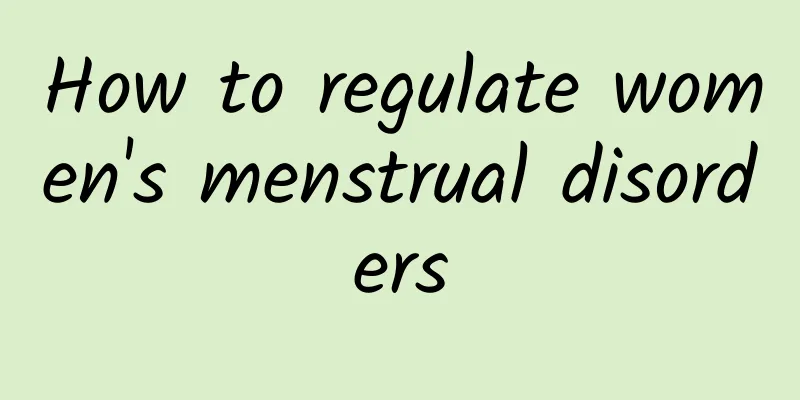Is bleeding a symptom of uterine fibroids? What medicine should I take? Is uterine bleeding a symptom of uterine fibroids?

|
Uterine fibroids are a common benign tumor in gynecology, mostly seen in women of childbearing age. Uterine fibroids are mainly formed by the proliferation of smooth muscle cells in the uterine muscles, and generally do not cause obvious symptoms. However, sometimes uterine fibroids can cause uterine bleeding, which raises some people's questions: Is bleeding caused by uterine fibroids? What medicine do I need to take to treat uterine bleeding? Let's take a closer look. We must make it clear that uterine bleeding does not necessarily mean that you have uterine fibroids. Uterine bleeding is a common gynecological symptom and may be caused by a variety of reasons, including endocrine disorders, reproductive system infections, cervical lesions, endometriosis, etc. Therefore, it is unscientific to identify uterine fibroids based solely on uterine bleeding. If you have uterine bleeding, it is recommended to seek medical attention in a timely manner and receive a comprehensive examination and evaluation from a doctor. So, if uterine bleeding is caused by uterine fibroids, how should it be treated? The first thing to be clear is that if uterine fibroids do not cause obvious symptoms or affect the quality of life, special drug treatment is generally not required. The doctor will develop a corresponding treatment plan based on the patient's specific situation. If uterine fibroids cause more severe bleeding, surgical treatment may be required, such as removal of the uterine fibroids or hysterectomy. For some special cases, such as women preparing for pregnancy or wishing to keep their uterus, doctors may consider giving drug treatment, such as luteinizing hormone-releasing hormone drugs. Let's introduce some relevant knowledge about uterine fibroids. Uterine fibroids are a common benign gynecological tumor, which is more common in women aged 20-50. Its occurrence is related to many factors, including genetic factors, changes in hormone levels, etc. Most uterine fibroids are small, asymptomatic, and do not require special treatment. However, for some larger fibroids that occur in the adenomyosis of the uterus, or fibroids that cause obvious symptoms such as pain, bleeding, etc., surgical treatment or drug treatment may be required. Bleeding is not necessarily caused by uterine fibroids. If uterine bleeding occurs, it is recommended to seek medical attention in time. The doctor will evaluate the specific situation and formulate a corresponding treatment plan to protect the patient's health. In order to prevent the occurrence of uterine fibroids, female friends should also pay attention to maintaining good living habits, avoid excessive fatigue, keep emotional stability, and have regular physical examinations. |
<<: What causes uterine adenomyosis to grow? Does uterine adenomyosis grow fast?
Recommend
Autumn and winter gluttony! 5 eating habits that can easily lead to obesity
The hot weather has eased a little and we can fin...
Decoding: Four major causes of vulvar leukoplakia
According to recent survey statistics, the number...
Daily care for endometrial tuberculosis
How should endometrial tuberculosis be cared for?...
How much does it cost to treat pelvic peritonitis?
Female friends are very familiar with pelvic peri...
Will ectopic pregnancy lead to spontaneous abortion? What are the treatments for ectopic pregnancy abortion?
Any pregnancy in which the fertilized egg implant...
How should I maintain my health after painless abortion surgery?
Painless abortion is a common operation in many h...
What is the normal age for women to enter menopause? It is about 45 to 55 years old
When women reach a certain age, their menstruatio...
Is prediabetes reversible? Nutritionist Chen Yichun: 3 tips to help people with prediabetes control blood sugar
According to a survey conducted by the National H...
7 minutes of high-intensity exercise = burning fat for 72 hours!
Can short-term exercise help you lose weight? The...
How long does it take to treat moderate cervical erosion?
Moderate cervical erosion usually needs to be tre...
How much does it cost to check for uterine fluid?
How much does it cost to check for uterine effusi...
How many years can I live with vulvar leukoplakia?
Vulvar leukoplakia is a chronic skin disease that...
What is the daily cost of treating congenital absence of vagina?
Congenital absence of vagina or vaginal atresia i...
What are the symptoms of mild cervical erosion in women? Check out the three major symptoms of mild cervical erosion in women
Cervical erosion can be mild or severe. Many wome...
Truth and Lies Can spot weight loss be trusted?
(Author: Park Soo-hee) People often wish to just ...









